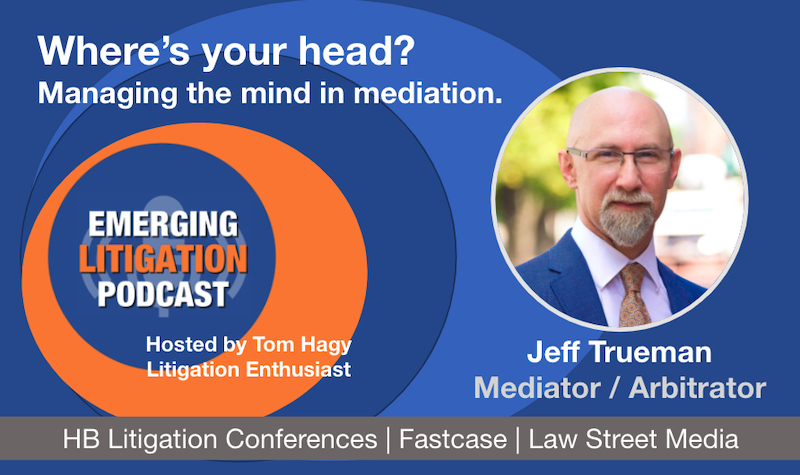Where’s Your Head? Managing the Mind in Mediation with Jeff Trueman

Joining me to discuss this is Jeff Trueman, an experienced, full-time mediator and arbitrator. Jeff helps parties resolve a wide variety of litigated and pre-suit disputes and interpersonal problems concerning catastrophic injuries, professional malpractice, wrongful death, employment, family business dissolution, real property, estate, and domestic relations. He is a panel mediator for the American Arbitration Association; a panel arbitrator for the Financial Industry Regulatory Authority; a Distinguished Fellow of the International Academy of Mediators; a recipient of the Paul A. Dorf Alternative Dispute Resolution Memorial Award by the Bar Association of Baltimore City; and will soon hold an LLM from the Straus Institute for Dispute Resolution at the prestigious Pepperdine School of Law.
Finally, did I really suggest that having a mediator with a bad hip could help achieve a faster resolution? Did I really give a review of the HBO original movie Oslo, which I consider a must-see for anyone interested in conflict resolution? Did I really compare married couples during Covid-19 lockdowns to angry bees in a jar? Listen and find out. Spoiler alert: Yes. Yes I did.
This podcast is the audio companion to the Journal on Emerging Issues in Litigation, a collaborative project between HB Litigation Conferences and the Fastcase legal research family, which includes Full Court Press, Law Street Media, and Docket Alarm. The podcast itself is a joint effort between HB and Law Street Media. If you have comments or wish to participate in one our projects, or want to tell me how Jeff really got you thinking, please drop me a note at Editor@LitigationConferences.com.
Tom Hagy
Litigation Enthusiast and Host of the Emerging Litigation Podcast
“Attorneys possess many of the same characteristics as their human cousins.” Someone said that. Probably me. They often bring to their jobs cognitive barriers that get in the way of negotiating resolutions to conflicts. Same for their human clients.
Things like refusal to cede the moral high-ground, or stubbornly believing there must always be someone to blame. Then there is overconfidence (i.e., “I am right and will win in court!”) or they might enjoy selective memory, confirmation bias, and loss aversion. Attorneys are often in the position of mediator and problem solver. What can attorneys do to more effectively achieve satisfactory outcomes when the parties bring in their own set of human characteristics and emotions?
